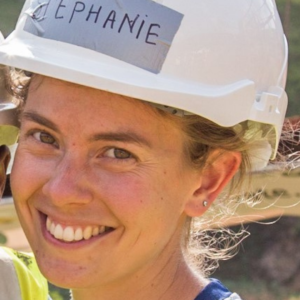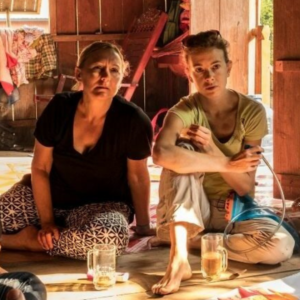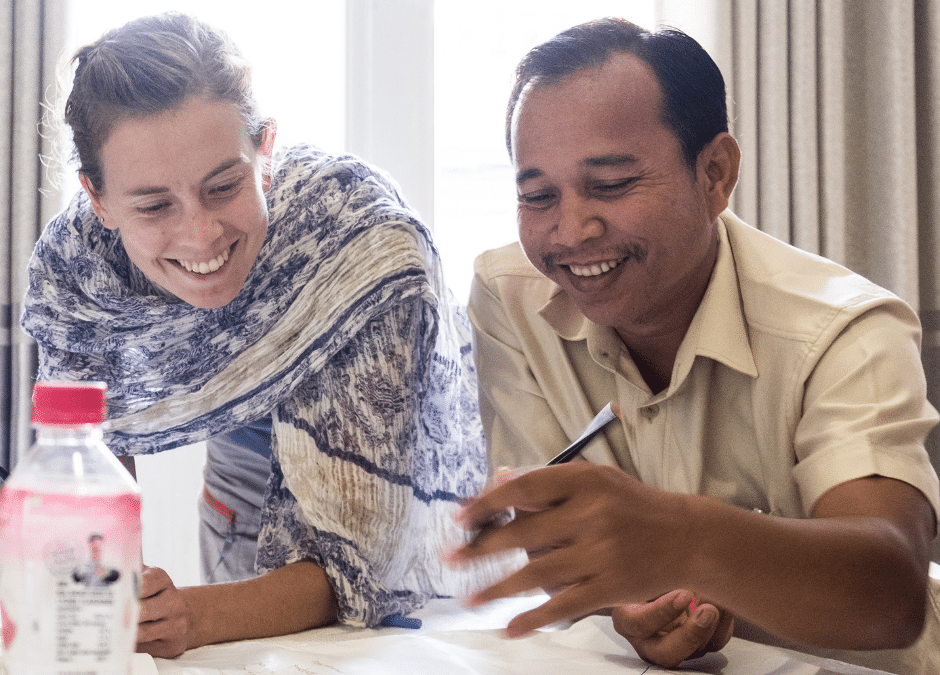When most children get tired of their toys, they’re usually thrown away or donated to the local charity shop. As a young kid growing up in Adelaide, Stephanie May’s mum encouraged her to give away her toys to other children, to bring them some joy. Stephanie was also urged to put aside a portion of her weekly pocket money to donate to a worthy cause. These important early lessons instilled in Stephanie an understanding and appreciation of the importance of giving back. It’s a value that is deeply embedded within her life, and has been a key principle in guiding her career choices.
Stephanie’s mum not only had a powerful influence on her social conscience, but also on her professional development. “When I was growing up, mum showed me that, as a woman, it is not only possible to fulfill the traditional, maternal role, but to also have a stimulating career. As an adult, she has become one of my mentors in managing and navigating the workplace in general,” says Stephanie.
As a school student, Stephanie had a keen interest in Maths and Science and was a natural problem-solver. These skills, combined with a love of creativity and strong values, sparked an interest in the world of engineering. She saw it could be a profession that might enable her to contribute to real-world change, all while doing something she loved. Civil engineering was a ticket to engage in social impact as a career. It’s an aspect of engineering that she thinks should be understood as a core part of the profession. “Engineers have a role to play in providing solutions to global challenges through creating and delivering products and services that directly serve society,” believes Stephanie.
Connecting with EWB
Stephanie’s journey with EWB first started over 12 years ago. As a young student about to enrol at the University of NSW, an opportunity to volunteer with EWB caught her eye, and the prospect of travelling to another country to explore solutions to social issues sounded pretty awesome.
She completed the EWB Challenge as a first-year student in 2008 as part of her degree. The challenge project involved designing a water supply system for a school in Cambodia, enabling greater access to safe water for locals. Innovation like this is vital for decreasing diseases and reducing the distance community members – most often women and children – need to travel each day to source safe water. This can enhance their capacity to go to school and work, thereby increasing the opportunities they have to positively change their lives.
Joining the local EWB Water Sanitation and Hygiene (WASH) Hub as a volunteer was an opportunity to better understand the water and sanitation sector, and work on a range of different volunteer projects. From this first volunteering experience, Stephanie learned a lot. In particular, she realised the importance of adopting a holistic approach to problem-solving. She has found that in order to implement sustainable and effective engineering solutions, you have to consider things beyond the technical elements, such as the social and environmental impacts.
In the third year of her degree, an academic exchange with the National Institute of Applied Sciences in Lyon, France, further nurtured Stephanie’s interest in the human and social aspects of engineering. During her exchange, Stephanie also got involved in France’s Ingénieurs Sans Frontières (Engineers Without Borders).
These experiences have each had a profound influence on Stephanie’s career path.
From Adelaide to Sydney, France to Rwanda

Stephanie May on site
Stephanie utilised her bilingual skills as an English and French speaker to commence her early career in France, working in a range of engineering roles – from coordinating the structural engineering needs of onshore wind turbines, to designing and project managing the civil needs of Paris’ water and wastewater infrastructure. During this time, Stephanie volunteered with Hydraulique Sans Frontières (Hydraulics Without Borders) designing reinforced concrete water tanks and other civil engineering structures for developing countries.
But her passion to use her skills and knowledge within the development sector was still there. It led her to join Bridges to Prosperity in Rwanda, an international NGO specialised in the design and construction of footbridges in rural areas. It was a role that allowed Stephanie to combine her dual passions of engineering and development work.
After three years working in the not-for-profit world of work, Stephanie has now moved back to the private sector, but is still combining her passions. As Project Manager for SHER Consulting, Stephanie works on designing and implementing drinking water supply and sanitation infrastructure projects in East Africa, based in Rwanda.
Reconnecting with EWB

Stephanie (right) with fellow participant Leah (left) on the Solutions for Sustainable Development intensive in Cambodia (2019)
In 2019, Stephanie connected once again with EWB Australia, participating in EWB’s pilot Solutions for Sustainable Development intensive in Cambodia. The eight-day-long program delved into the fundamentals of human-centred design, sustainable development and the local culture. It was the start of another opportunity to volunteer with EWB, this time in a professional capacity, with over five years of work experience now under her hardhat.
This experience segued into joining EWB as an Australian Volunteer Professional, supporting the implementation of some of the work she contributed to as part of the 2019 Cambodia professional development intensive.
In 2020, she commenced volunteering as an EWB WASH Capacity Development Mentor in Cambodia, in a remote capacity due to the pandemic. In her role, she supports the water and sanitation project that aims to address the United Nations’ Sustainable Development Goal 6: clean water and sanitation for all. Stephanie is working with the Ministry of Rural Development in Cambodia to implement and sustain toilets and clean water systems in challenging environments, reducing the risk of disease and poor health outcomes.
The most rewarding part of her volunteer work is collaborating with the Cambodian government and other NGOs to utilise the diverse strengths of different institutions and organisations to drive positive change. Stephanie strongly believes that empowering individuals and organisations to deliver their own solutions is just as important as implementing technological solutions in driving lasting change.
“I am particularly passionate about EWB’s strategy to drive change not only through implementing technology solutions, but strengthening the capacity of individuals, organisations and institutions to deliver the solutions themselves,” says Stephanie. “It’s rewarding to see them driving their own change.”
Not just COVID
There have, however, been a few challenges working as a volunteer engineer. Working remotely due to the COVID-19 pandemic has made it difficult for her to truly grasp the cultural and social norms of the local people. It makes designing solutions that would effectively meet the unique needs of these communities more challenging. Stephanie tackles by relying on the guidance and insights of EWB’s in-country team based on the ground in Cambodia.
Stephanie is concerned about how the pandemic will impact people living in low-income countries. Specifically, that our own struggles in living with a pandemic might lead many to turn a blind eye to the struggles of those living in conflict or poverty. Being based in Rwanda, she is experiencing first-hand the effects of the pandemic on vulnerable communities, which for many have been more devastating economically than from a health perspective.
“For many people in developing countries, Coronavirus is just the tip of the iceberg of the challenges they face. We need to remember that for many people, Covid is just another difficulty and there could be other, more immediate hardships – for which we still need to provide support,” she says.
Nevertheless, Stephanie is hopeful that the skills and knowledge of all people will begin to be valued and utilised for driving change.
“I am hopeful that we will come to value the skills and knowledge of people around the world, and not just from so-called “developed” countries or with certain “formal” qualifications,” she says.
Future fun
Stephanie’s next big career goal is to achieve a better work-life balance. So far, that recently included a 30 day, 500 kilometre hike along the south-Aegean coast of Turkey. Her other idea of fun includes the work she does for EWB. She says, “When we’re passionate about our work, it’s easy to let it become all-consuming; but to remain effective, one needs to take some time out – even if that’s to volunteer.”
If you’re interested in volunteering with EWB, you can find out more here.
EWB Australia’s work in Cambodia receives support from the Australian Government through the Australian NGO Cooperation Program (ANCP). You can also donate to support our work in Cambodia.


